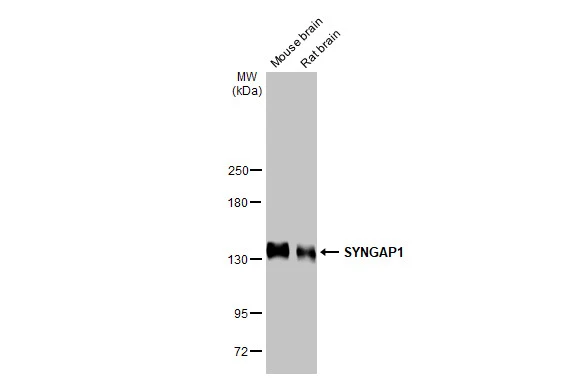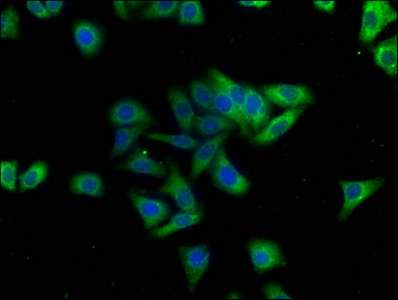
Various tissue extracts (50 μg) were separated by 5% SDS-PAGE, and the membrane was blotted with SYNGAP1 antibody (GTX131673) diluted at 1:1000. The HRP-conjugated anti-rabbit IgG antibody (GTX213110-01) was used to detect the primary antibody.
SYNGAP1 antibody
GTX131673
ApplicationsImmunoFluorescence, Western Blot, ImmunoCytoChemistry
Product group Antibodies
ReactivityHuman, Mouse, Rat
TargetSYNGAP1
Overview
- SupplierGeneTex
- Product NameSYNGAP1 antibody
- Delivery Days Customer9
- Application Supplier NoteWB: 1:500-1:3000. *Optimal dilutions/concentrations should be determined by the researcher.Not tested in other applications.
- ApplicationsImmunoFluorescence, Western Blot, ImmunoCytoChemistry
- CertificationResearch Use Only
- ClonalityPolyclonal
- Concentration1.38 mg/ml
- ConjugateUnconjugated
- Gene ID8831
- Target nameSYNGAP1
- Target descriptionsynaptic Ras GTPase activating protein 1
- Target synonymsMRD5, RASA1, RASA5, SYNGAP, ras/Rap GTPase-activating protein SynGAP, Ras GTPase-activating protein SynGAP, Ras/Rap GTPase-activating protein 1, neuronal RasGAP, synaptic Ras GTPase activating protein 1 homolog, synaptic Ras GTPase activating protein, 135kDa
- HostRabbit
- IsotypeIgG
- Protein IDQ96PV0
- Protein NameRas/Rap GTPase-activating protein SynGAP
- Scientific DescriptionThis gene encodes a Ras GTPase activating protein that is a member of the N-methyl-D-aspartate receptor complex. The N-terminal domain of the protein contains a Ras-GAP domain, a pleckstrin homology domain, and a C2 domain that may be involved in binding of calcium and phospholipids. The C-terminal domain consists of a ten histidine repeat region, serine and tyrosine phosphorylation sites, and a T/SXV motif required for postsynaptic scaffold protein interaction. The encoded protein negatively regulates Ras, Rap and alpha-amino-3-hydroxy-5-methyl-4-isoxazolepropionic acid receptor trafficking to the postsynaptic membrane to regulate synaptic plasticity and neuronal homeostasis. Allelic variants of this gene are associated with intellectual disability and autism spectrum disorder. Alternative splicing results in multiple transcript variants. [provided by RefSeq, Nov 2016]
- ReactivityHuman, Mouse, Rat
- Storage Instruction-20°C or -80°C,2°C to 8°C
- UNSPSC41116161

![SYNGAP1 antibody detects SYNGAP1 protein at Synapse by immunofluorescent analysis. Sample: DIV10 rat hippocampal neuron cells were fixed in 4% paraformaldehyde at RT for 15 min. Green: SYNGAP1 stained by SYNGAP1 antibody (GTX131673) diluted at 1:500. Red: Tau, a marker, stained by Tau antibody [GT287] (GTX634809) diluted at 1:500. SYNGAP1 antibody detects SYNGAP1 protein at Synapse by immunofluorescent analysis. Sample: DIV10 rat hippocampal neuron cells were fixed in 4% paraformaldehyde at RT for 15 min. Green: SYNGAP1 stained by SYNGAP1 antibody (GTX131673) diluted at 1:500. Red: Tau, a marker, stained by Tau antibody [GT287] (GTX634809) diluted at 1:500.](https://www.genetex.com/upload/website/prouct_img/normal/GTX131673/GTX131673_44293_20210611_ICC_IF_R_w_23060523_643.webp)





![Various tissue extracts (50 μg) were separated by 5% SDS-PAGE, and the membrane was blotted with SYNGAP1 antibody [HL2292] (GTX638347) diluted at 1:1000. The HRP-conjugated anti-rabbit IgG antibody (GTX213110-01) was used to detect the primary antibody.](https://www.genetex.com/upload/website/prouct_img/normal/GTX638347/GTX638347_T-44984_20230325_WB_M_R_23032819_329.webp)
